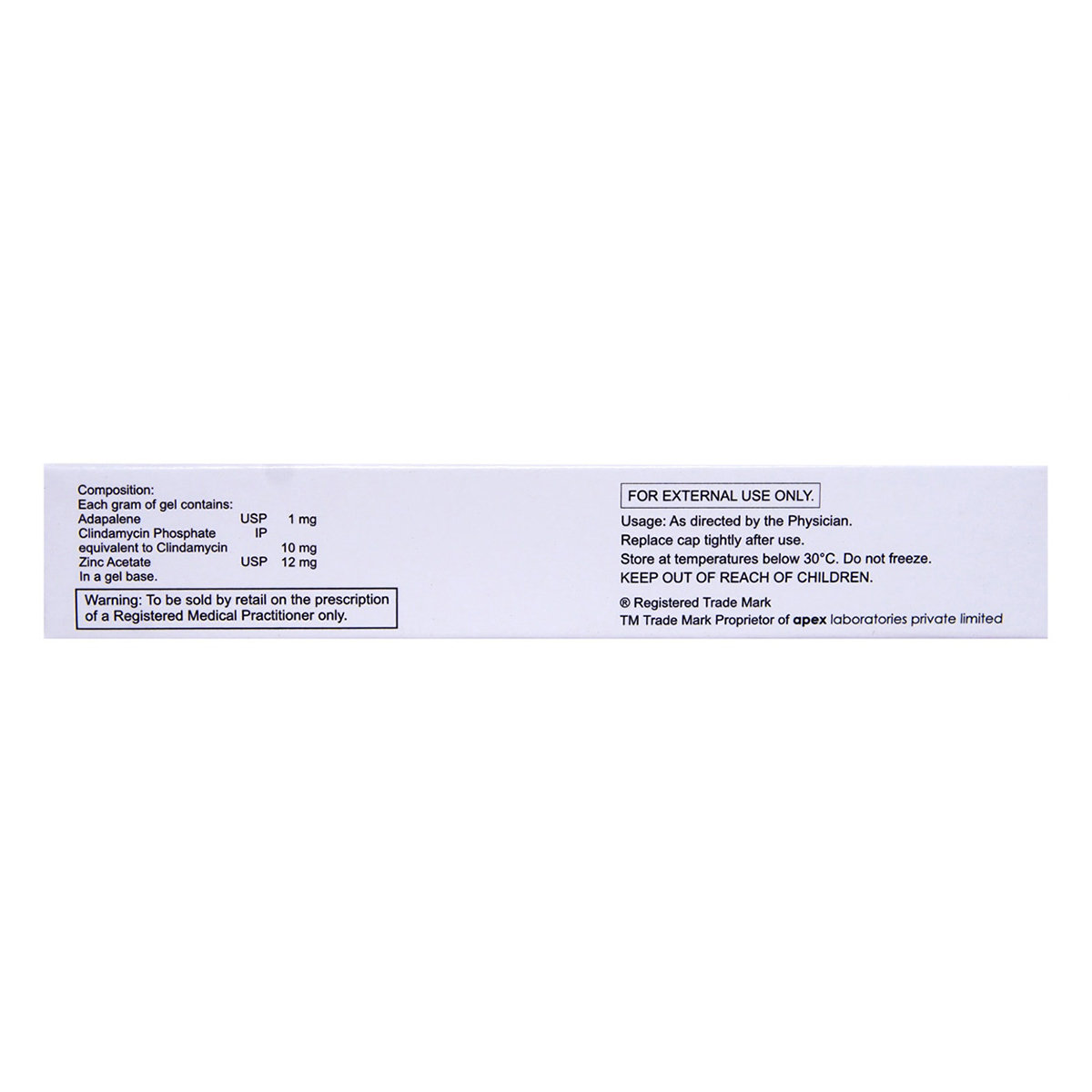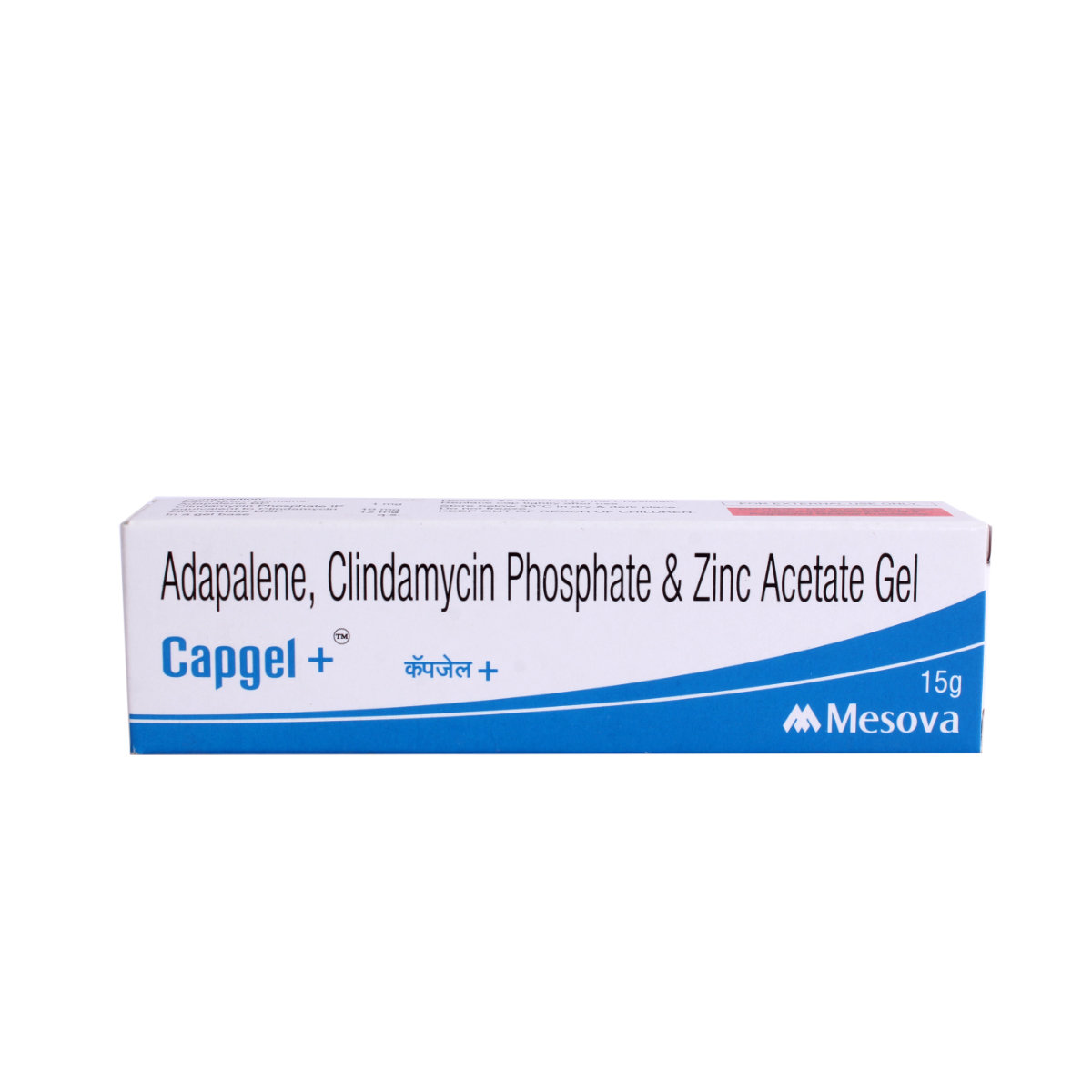Capgel Plus Gel

MRP ₹210
(Inclusive of all Taxes)
₹31.5 Cashback (15%)
Capgel Plus Gel is used to treat acne (pimples). It contains adapalene, clindamycin, and zinc acetate. Adapalene works by loosening the cells on the skin's surface and unblocking pores by reducing the production of oil in the skin, thereby reducing the formation of pimples, whiteheads, and blackheads on the skin surface. Clindamycin stops or slows down the growth of bacteria, preventing the growth of acne. Zinc acetate, an antibacterial and anti-inflammatory agent, helps to reduce inflammation, prevent infection, and promote wound healing, further enhancing the treatment of acne and related skin conditions. In some cases, it may cause side effects such as skin peeling, dry skin, irritation, redness, itching, or a burning sensation at the site of application. Before using this medicine, inform your doctor if you are allergic to its components, pregnant, breastfeeding, taking any medications, or have pre-existing medical conditions.
Know Your Delivery Time
Provide Delivery Location
 Prescription drug
Prescription drugWhats That

Secure Payment

India's Most Trusted Pharmacy

Genuine Products
- After taking a shower or bath, apply a moisturizer to damp skin.
- Use petroleum jelly or other thick emollients.
- Use a hypoallergenic, fragrance-free moisturizer 2 to 3 times a day or as frequently as required.
- Exfoliate your skin gently using a pumice stone or slightly abrasive sponge.
- Do not scrub your skin.
- Avoid hot showers or baths. Instead take short, warm showers or baths.
- Use mild soap or skin cleansers with added moisturizer.
- Drink lots of water.
- Use sunscreen and wear protective clothing while going out to protect yourself from sun damage.
- If you experience burning or stinging sensations and suspect that they may be related to medication, consult a doctor or healthcare expert to determine the cause and best course of treatment.
- Avoid harsh products, extreme temperatures, and other potential irritants that may exacerbate burning or stinging.
- Your healthcare professional may recommend applying a soothing or protective agent, such as a cream, gel, or ointment, to help alleviate burning or stinging.
- Follow your healthcare professional's advice on how to care for the affected area, as gentle cleaning and care instructions may vary depending on the location and severity of the burning or stinging.
- Schedule follow-up appointments with your doctor to monitor your symptoms and adjust your treatment plan as needed. If the burning or irritation persists or worsens, seek medical attention.
- Consult your doctor if you experience skin redness, itching, or irritation after taking medication.
- Your doctor may adjust your treatment plan by changing your medication or providing guidance on managing your erythema symptoms.
- Your doctor may recommend or prescribe certain medications to help alleviate symptoms.
- Apply cool compresses or calamine lotion to the affected skin area to reduce redness and itching.
- Stay hydrated by drinking plenty of water to help alleviate symptoms and keep your skin hydrated.
- Monitor your skin condition closely and promptly report any changes, worsening symptoms, or concerns to your healthcare provider.
- Avoid extreme heat or cold, like hot showers or cold winds, to prevent worsening skin discomfort.
- Cool compresses: To reduce itch, redness, and swelling.
- Avoid irritants like harsh chemicals or allergens to prevent worsening skin discomfort.
- If you have severe itching, burning, or blistering seek medical attention.
- Report the itching to your doctor immediately; they may need to change your medication or dosage.
- Use a cool, damp cloth on the itchy area to help soothe and calm the skin, reducing itching and inflammation.
- Keep your skin hydrated and healthy with gentle, fragrance-free moisturizers.
- Try not to scratch, as this can worsen the itching and irritate your skin.
- If your doctor prescribes, you can take oral medications or apply topical creams or ointments to help relieve itching.
- Track your itching symptoms and follow your doctor's guidance to adjust your treatment plan if needed. If the itching persists, consult your doctor for further advice.
- Sunburns can occur commonly. Cover the area that is affected to avoid extended exposure.
- Apply a clean, dampened towel to the affected skin for relief.
- Take a cool bath by adding baking soda to water.
- Sleep well and give enough rest to your body.
- Take a balanced diet that heals the allergy or burns.
- Apply a skin-calming lotion, gel or moisturiser frequently.
- Avoid scratching the affected area.
- Wear loose clothing to reduce irritation.
- Keep the affected area moisturized with a gentle moisturizer.
- To alleviate the reaction, remove the irritant by immediately stopping contact and washing the area with mild soap and cool water.
- Apply a cool, wet compress to reduce inflammation and itching.
- Consult a doctor if your skin reaction is severe, widespread, or accompanied by swelling, blistering, or breathing difficulties.
Drug-Drug Interactions
Drug-Drug Interactions
Login/Sign Up
Drug-Food Interactions
Drug-Food Interactions
Login/Sign Up
Capgel Plus Gel Substitute

Product Substitutes

Have a query?













